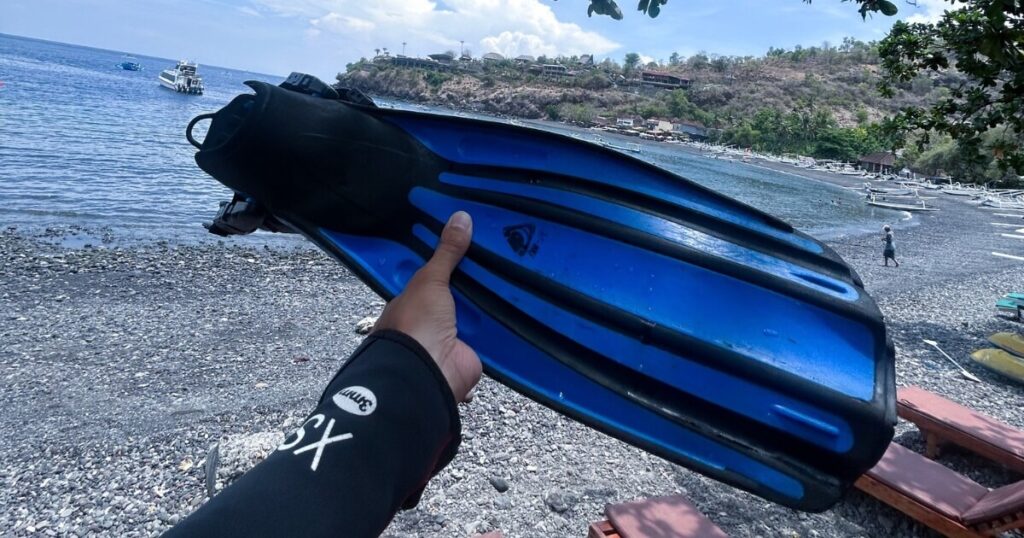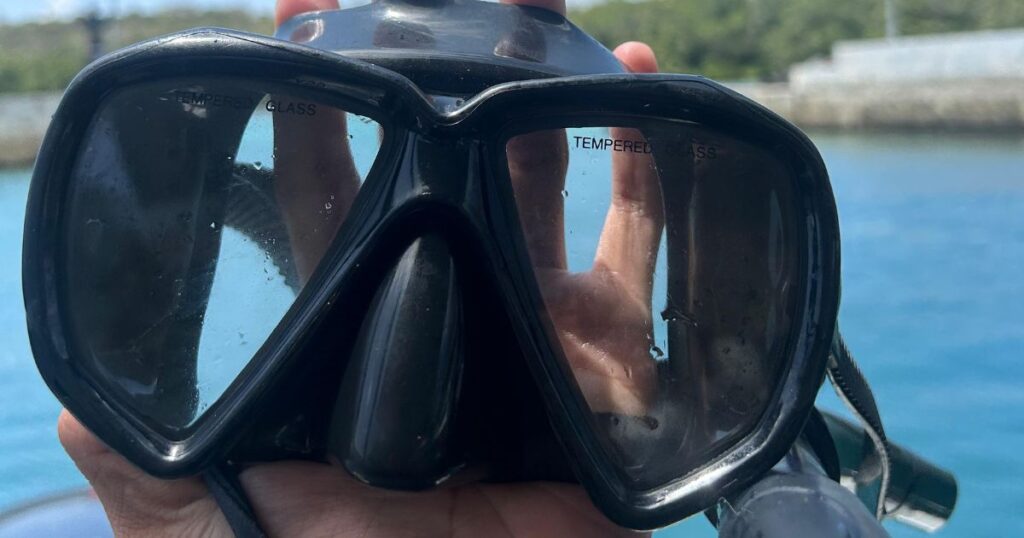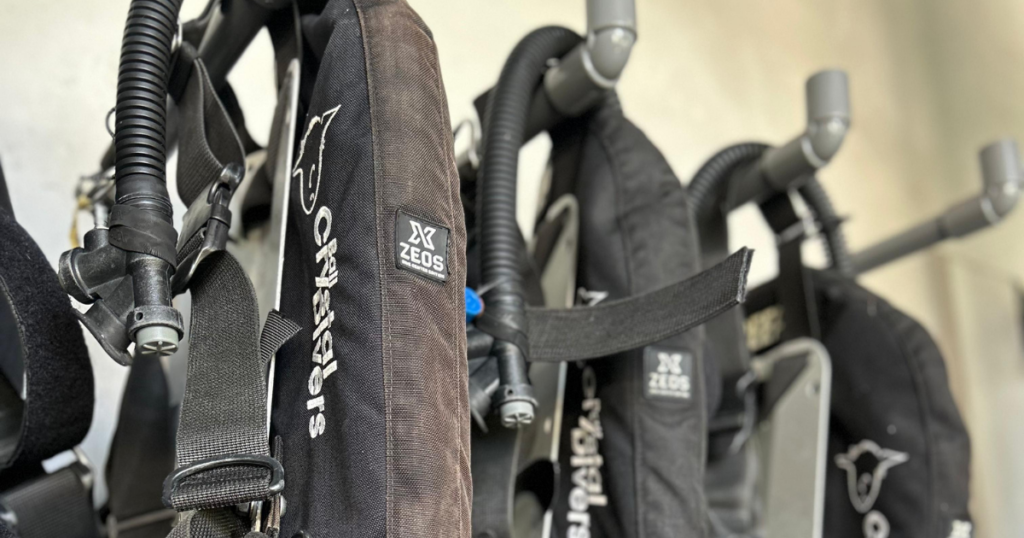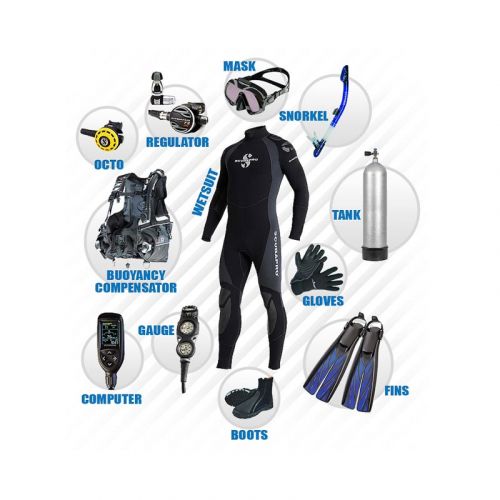When it comes to scuba diving equipment, it’s a common dilemma when it comes to whether you should buy your own gear or continue renting. If you think you’d like to buy gear, when is the right time to buy and what items are most important to buy?
Buying gear can be a big investment so it’s important to look at all of the options and make a decision that is personally right for you. After all, there is no universal answer, but there are some good guidelines to help you reach your decision. Here are some pros, cons and suggestions for both new divers and experienced divers to help you navigate your way around the dive store!
What Equipment is Needed for Scuba Diving?
If you’re thinking about getting fully kitted out for scuba diving, brace yourself—you could buy everything, but you might need to sell a kidney to afford it! That said, here’s what makes up a diver’s dream setup. First, you’ll need a mask, snorkel, and fins, the trifecta for seeing and moving underwater. Then comes the wetsuit or drysuit, depending on whether you’re braving tropical waters or something colder.
The big-ticket items? A Buoyancy Control Device (BCD) to keep you floating (or sinking) like a pro, a regulator set for breathing like a fish, and a dive computer. If you’re feeling fancy, throw in a dive knife, dive light, and surface marker buoy to keep things safe and stylish. Oh, and don’t forget a trusty gear bag to haul it all around. All of the above would make for a well geared diver but the real question is, do you need to buy it all?
Is It Really Necessary For Me To Buy My Own Gear?
Usually it is not necessary to own any of your own scuba gear to go on diving. However, there are some exceptions such as professional divers who may be required to have their own gear for work, divers who have special fitting requirements and if you are taking a trip to a very remote region (or on some liveaboards) which require you to supply at least your own basics – mask, snorkel, fins and wetsuit.

So Why Buy Diving Equipment if I Can Rent?
There are numerous plus points to owning your own gear, here are the main ones:
- Comfort and Fit: When you buy your own gear you’ll take some time trying on different sizes and styles to get the item that is most comfortable for you. This is important – a badly fitting rental BCD or leaking mask can really take away from truly enjoying your dive.
- Safety through Familiarity: When you have your own gear you get familiar with it, you know exactly where everything is which increases safety – your SMB is in the same pocket as it always is; you know where your alternate air source is and it’s easy to locate other accessories. It can also help with buoyancy control as having the same fins and BCD you know if you need air in your BCD when you dive and how buoyant your fins are. These things can affect your trim when you go to dive and although a good diver knows how to adjust, proper equipment can make it that much easier.
- Long Term Saving: Depending on where you are, diving equipment rental prices can vary considerably. When making longer trips, equipment rental can make a sizeable difference to the overall cost of your holiday if you are planning to dive every day.
- Trust: Having your own gear means that you know its history and that it has been well looked after and is functioning correctly. At Crystal Divers all of our rental gear is either new or well maintained according to our thorough maintenance schedule. We also have a dive equipment servicing team on hand, for any of our divers. Sadly, this is not always the case at all dive centers and equipment faults are not always easily or immediately visible when hiring gear.
- The Right Item for the Job: Some divers have certain gear requirements which may not be guaranteed if you are renting. For example, an underwater photographer may need large BCD pockets to store interchangeable wet lenses. Others might prefer their alternate air source placement on the left as opposed to the traditional right. Your own personal set up will ensure your equipment it just the way you like.
- Multi-purpose: Not all scuba diving equipment is only for scuba diving. If you have your own mask, snorkel, and fins you can pack them for any beach holiday; wetsuits and rash vests can be used for other water sports and many dive computers also include free-diving modes.
- Dive Computers: Each dive computer has different settings, buttons, menu, functions and algorithms. Trying to figure out a different model of rental computer each time you dive can be time consuming and frustrating! Having your own computer means you will get to know how it works and many computers will link up to your laptop so you can transfer your logged dives instantly.

Okay, So What Are The Cons?
- If you are planning to dive on holidays then consider your baggage allowance. Some airlines will give an additional allowance for scuba gear – if they do not then you could be charged for excess baggage at the airport.
- Different Locations, Different Requirements: That 3mm shortie that you love may be great when you dive at home, but what about when you travel to cooler waters?
- Servicing and Maintenance: If you have your own gear then you need to look after it and this extends beyond rinsing it after diving. Regulators need servicing and parts (especially O-rings), need replacing periodically; dive computers need battery changes and BCD inflator hoses need to be cared for.
- Storage: You will need somewhere to store your gear at home when you are not using it. This should be somewhere cool and dry where it can be hung up or laid flat.
- Try Before You Buy: Here’s the kicker with diving gear, you can try it on in the shop but not in the water!
- Finances: There is no way around this one – buying a full set of gear is a big investment.

Confused? Here are some suggestions:
-
- When you rent gear, ask to use different options during your stay so you can see which one is working best for you. If you find something you like, make a note of the manufacturer, model and size. Ask if you can purchase it there or if they know where it is available.
- In the dive store, before you buy any item, take your time and try on plenty of different models. Make it clear to the sales staff what type of diving you will be doing and what your requirements are.
- Think about where you will be diving and the type of diving. If you want to dive on holidays then consider travel BCDs which are lightweight and roll up in your luggage. If you know you will be diving mainly at home and not moving around then a heavier duty BCD might be more suitable.
- When purchasing a diving mask remember that fit is everything, the best mask in the world will not work for you if it doesn’t fit properly.
- If you are a “traveling diver”, buy a wetsuit combination that gives you several options for different water temperatures. A good 5mm wetsuit with a 3mm shortie covers most eventualities; the shortie for tropical water, the 5mm for temperate waters and the 3mm shortie over the 5mm for cooler waters.
- Pro Discounts – At Crystal Divers we offer a pro discount on gear in our shop. Show your Divemaster or Instructor card and we’ll happily discount your purchases! If you are taking your PADI Divemaster program with us we also include free equipment hire. This gives you the chance to use items over a period of time and then buy the same items which you like best though our store – complete with your pro discount!
- Step by Step Purchasing: Keep it in mind that you do not need to buy a full set of gear. It’s easy with scuba equipment to gradually accumulate your set. We have guides on how to pick the perfect fins, mask, BCD and computer. Take a look through and see what seems like the best first purchase for you!
Safety First! Always make sure that you buy from a reputable dealer and follow any manufacturers’ instructions.
What Next?
Do you have questions about what equipment is suitable, renting gear or buying equipment while you are here? Drop us an email to: [email protected] or fill in our online contact form and we will get right back to you!
We look forward to diving in Bali with you soon!




